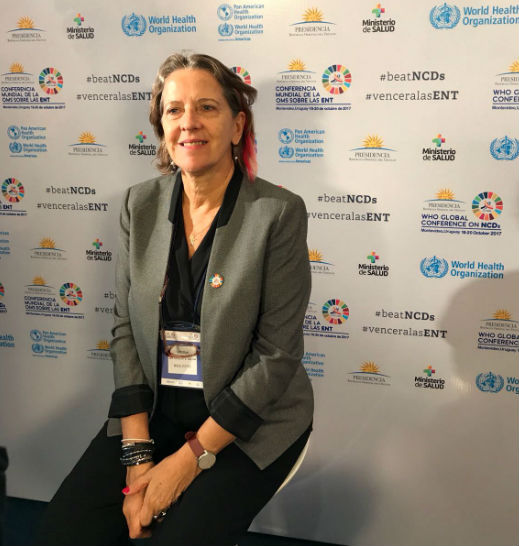
WHO FCTC Secretariat
Good morning, my esteemed colleagues and friends, and thank you for this opportunity to describe how the WHO Framework Convention on Tobacco Control, the UN’s tobacco control treaty, can make a significant contribution to the battle against noncommunicable disease.
The need for new approaches is clear and this meeting is recognition of that uncomfortable fact. The world’s ambition for NCD reductions by 2030 is currently falling short. And yet we have just 13 years to reduce premature mortality from NCDs by a third, and thereby achieve Sustainable Development Goal 3.4.
In short, we have a mountain to climb and not much time to do it.
Organizations like my own have already spent years on these dangerous byways, which allow us to help chart a course for others to follow. In other words, the NCD targets can be met, but only by exploiting what we already know about how to avoid pitfalls, and how to make progress.
Let me tell you something more about our treaty.
The WHO FCTC took effect in 2005 and was, and still is, the first global public health treaty. The Convention is based on strong evidence and sets minimum standards for its 181 Parties, pressing for the adoption of stronger tobacco-control policies and legislation to reduce the seven million deaths a year which are caused by this noxious product.
The Convention Secretariat, which I lead, now has more than a decade’s experience in formulating, implementing and advising on methods to tackle the tobacco epidemic, one of the four main causes of NCDs.
Our knowledge is unique and while it relates to tobacco, it contains valuable lessons on viable approaches to the broader NCD crisis. Our role is recognised within the SDGs, as Target 3.a, which requires states to implement the Convention, as appropriate.
So, what have we learned over the years and how can this help to control NCDs?
Action on tobacco control has been greatly assisted by the creation of cross-departmental coordinating bodies within governments, with all key ministries and agencies represented. Many WHO FCTC Parties have already established national coordinating bodies which effectively bring the health ministry together with key players like the finance and industry ministries, and customs. These bodies could be utilized in the battle against NCDs if they were given a wider remit, or could be used as a model.
We have seen that such governance structures foster better administration, encouraging joined-up government, while also informing non-health officials on the benefits of tobacco control.
For example, finance ministries often question the cost and benefits of tobacco control programmes. This can be answered by health officials with access to high-quality international research, often accessed through the Convention Secretariat. Such research can prove that relatively small expenditures provide manifold returns to the taxpayer - and that while smokers help themselves by quitting, they also help the national balance sheet.
Our evidence can also be used to expand financing, as with increased tobacco taxation, a policy whose utility was recognised by the UN as a key source of future development finance at the 2015 Addis Ababa summit.
If countries raised tobacco pack prices by 80 cents, tobacco consumption would drop by 9% and, additionally, global tax revenue would increase by 140 billion US dollars. That equates to 66 million fewer adult smokers, an extraordinary number. But here’s the key point – falling consumption is more than outweighed by increased revenue from rising prices.
The WHO FCTC can help make this case and when Parties are willing, the money can be used for tobacco and other NCD programmes, and on improved healthcare, like tobacco cessation services. Increasing tobacco tax creates a truly virtuous circle.
Our treaty is also a monitoring mechanism, with Parties providing regular updates on progress towards WHO FCTC goals. Clearly, something similar is needed to measure NCD developments, and Parties’ experience garnered through the Convention may be critical.
Last but not least, I must mention the behaviour of the tobacco industry, those shameless global monoliths which continue to profit from human misery.
The industry does all it can to sabotage our work, and to continue the unjustified sale of products contributing to the deaths of half its consumers. And yet while global tobacco may be the worst corporate offender, it isn’t alone given that other industries also sell produce they know is injurious to human health.
Confronting the tobacco industry’s behind-the-scenes lobbying campaigns, richly funded public relations distortions and the use of bogus litigation to intimidate poorer nation states is a part of our work. The Convention contains an article, 5.3, which requires Parties to resist tobacco industry interference.
Such interference is becoming a model for other businesses faced with health campaigns, so Article 5.3 might well provide a good countermeasure. Indeed, it provided the inspiration for UN agencies in creating a model policy for use against tobacco industry interference. Again, we’re happy to share our hard-won knowledge on this issue.
And that’s really my message in a nutshell – come and talk to us, so that we can pool ideas and experience. We don’t say we’re the only organization with useful lessons for others, but I believe we are one of them. We are unique – we know how powerful an international treaty can be and how intersectoral cooperation can make a difference. This cross-fertilisation is critical given that the NCD campaign is on a tight schedule, so we mustn’t waste time reinventing the wheel.
The WHO FCTC is a very good place to start your efforts to control NCDs.
Thank you very much.